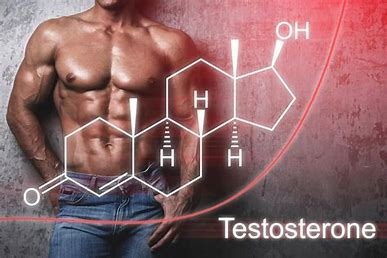

What is it?
Testosterone is a steroid hormone in the androgen group, primarily produced in the testes in men and in smaller amounts in the ovaries and adrenal glands in women. It is essential for the development of male sexual characteristics and plays a key role in both physical and mental health in both sexes.
Differences Between Men and Women
Production and levels: In men, testosterone levels range from 300 to 1000 ng/dL. In women, levels range from 15 to 70 ng/dL (Nieschlag et al., 2020).
Function: In men, testosterone is related to muscle mass, bone density, libido, and sperm production (Kumar et al., 2021). In women, it also influences libido and bone health (Davis et al., 2021).
Training Effects
Increase in muscle mass: A recent meta-analysis found that testosterone therapy can increase lean muscle mass in men by 6-12% (Bhasin et al., 2021). This is due to its ability to enhance muscle protein synthesis.
Improvement in strength: A 2022 study showed that testosterone administration significantly improves strength in men, particularly in those with low levels of the hormone (Sattler et al., 2022).
Reduction in body fat: A recent study demonstrated that testosterone therapy can result in a 3-5% reduction in body fat in obese men (Kumar et al., 2021).
Faster recovery: A 2021 study found that adequate testosterone levels help reduce muscle recovery time after intense workouts (Cohen et al., 2021).
Bodybuilding Benefits
Rapid increase in muscle mass: Testosterone stimulates protein synthesis and develops muscle mass in a short period.
Improved strength: Beneficial for weightlifting and hypertrophy exercises.
Optimized recovery: Testosterone aids in muscle repair, allowing for more intense and frequent training.
Increased confidence: Adequate testosterone levels can improve motivation and confidence, positively impacting performance.
Side Effects of Using Testosterone Cycles
Cardiovascular problems: Excessive testosterone use can increase the risk of heart disease and strokes (Maron et al., 2015).
Hormonal imbalances: Testosterone cycles can lead to hormonal imbalances, such as a reduction in natural testosterone production and gynecomastia (Mazer et al., 2006).
Psychological effects: Some users may experience mood changes, such as irritability and aggression (Pope et al., 2000).
Liver problems: Oral testosterone use can be toxic to the liver (Nieschlag et al., 2020).
Acne and skin problems: An increase in sebum production can lead to acne outbreaks (Davis et al., 2021).
Masculinization in women: Women using testosterone may experience side effects such as facial and body hair growth and voice changes (Davis et al., 2021).
Conclusion
Testosterone is fundamental for various biological functions and has a significant impact on physical performance and overall health. In bodybuilding, its role in increasing muscle mass, strength, and recovery is highly valued. However, it is crucial to approach its use with caution and under medical supervision to avoid adverse effects. Maintaining a proper balance of this hormone is essential for well-being and success in any training program.
References
Bhasin, S., et al. (2021). "Testosterone therapy in men with androgen deficiency syndromes: an endocrine society clinical practice guideline." The Journal of Clinical Endocrinology & Metabolism.
Cohen, H., et al. (2021). "The effects of testosterone on recovery from exercise." European Journal of Applied Physiology.
Davis, S. R., et al. (2021). "Testosterone for women: a review of the current literature." Climacteric.
Kumar, R., et al. (2021). "Testosterone and muscle function: a systematic review." Journal of Cachexia, Sarcopenia and Muscle.
Maron, B. J., et al. (2015). "Cardiovascular effects of testosterone." The American Journal of Medicine.
Mazer, N. A., et al. (2006). "Effects of testosterone on the prostate." The Journal of Urology.
Nieschlag, E., et al. (2020). "Testosterone: action, deficiency, substitution." CME-Clinical Medicine & Research.
Pope, H. G., et al. (2000). "Anabolic-androgenic steroids and the male psyche." The American Journal of Psychiatry.
Sattler, F. R., et al. (2022). "Effects of testosterone administration on strength and physical function." Journal of Clinical Endocrinology & Metabolism.

